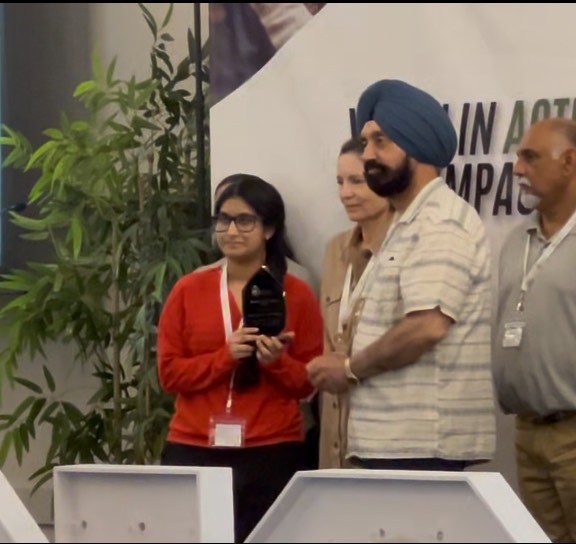L.A. Matheson Secondary student wins Voice of the Future Award for disability advocacy
 Grade 11 L.A. Matheson Secondary student Alisha Sharma was named this year's Voice of the Future Award winner by the PICS Society for her advocacy work as part of the school's disability student union.
Grade 11 L.A. Matheson Secondary student Alisha Sharma was named this year's Voice of the Future Award winner by the PICS Society for her advocacy work as part of the school's disability student union.
A visually impaired student at L.A. Matheson Secondary is being praised for her advocacy for students with disabilities, with the Progressive Intercultural Community Service (PICS) Society naming her this year’s Voice of the Future Award winner.
Grade 11 student Alisha Sharma received the award at last month’s NextGen Youth Impact Summit, recognized for her work as a founding sponsor with the L.A. Matheson Disability Student Union to promote awareness and inclusion of those with disabilities. Sharma has made on numerous class presentations in front of hundreds of students to share her lived experience with visual impairment and how to break down stigmas around disabilities.
“Her willingness to speak up for equity, true inclusion and bluntly point out ableist structures and mindsets are amazing to see from someone so young,” said teacher Annie Ohana. “She is incredibly resilient not because of what she overcomes daily but because of how she refuses to accept that things cannot change.”
Since the student union was founded in April of this year, Sharma has engaged peers on her day-to-day life as someone with bilateral retinal coloboma, iris coloboma and nystagmus – conditions that she has had since birth that affect her eyesight. Through these presentations, she seeks to clarify misconceptions around visual impairment and blindness, explaining that it is not simply whether or not someone can see, and that there are many degrees of visual impairment.
“For people with visual impairment and blindness, there’s a huge spectrum,” said Sharma. “My visual acuity is about 20 over 200, meaning I can see anything and everything, but the issue here with me is reading very small text or reading text that’s farther away.
“I usually need materials with larger text, and because of that, I prefer to do a lot of work online and typing things out. Writing on paper can get very draining.”
When the opportunity to start the student union came up, Sharma jumped at the chance to join – “’This is so me,’” she recalled thinking – noting the student union is open to anyone, whether or not they have a disability. She said she saw the group as a way to educate others on various disabilities and to create a supportive community of students around issues they face regarding accessibility and acceptance.
“When you have a disability, especially one that's either very visible or not visible enough, it’s a difficult experience in high school,” she said. “Our goal is to make students with disabilities feel more comfortable, more heard and more seen, and to stand up against ableism.
“It’s something that I talk about a lot in speeches, especially the infantilization that a lot of children and adults with disabilities face, and this gives me and other students a platform to fight against it.”
Sharma said the response to the student union and her work has been exceedingly positive and has inspired her to pursue other ways of promoting inclusion for those with disabilities. She is currently assisting Blind Beginnings, a non-profit organization that supports blind and partially sighted children and youth in B.C., with writing an accessible children’s book for visually impaired children.
She said she intends to continue her advocacy work, with plans to collaborate with BASES (Building Academic, Social and Employment Skills) students and engage Grade 8 classes on the purpose of the student union and how they can join and support students with disabilities.
“I know that they only way I’m going to get my point across is by speaking up and sharing my experience and having educated responses that have a lot of research behind them,” said Sharma. “And I feel like as I grow and do more for the disability student union, I can affect more positive change for myself and other students.”



